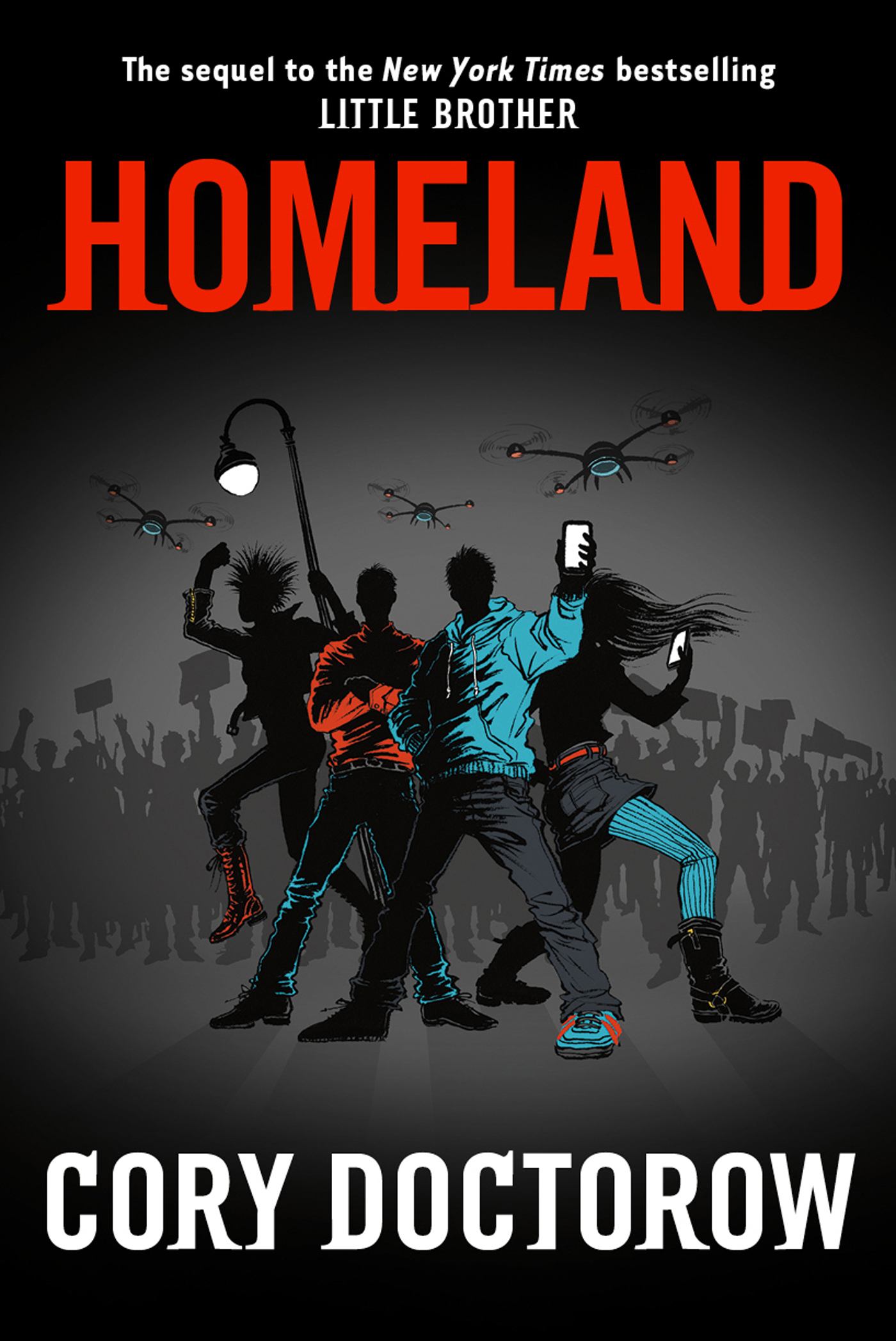Paranoia, Power, Politics, Police, and Protest
A Review of Cory Doctorow’s Homeland (Tor Teen, 2013)
By Derek Newman-Stille

Marcus was known as m1k3y when he was younger, a web protestor and advocate of human rights who exposed government corruption. In Homeland, Marcus is a young adult, just beginning life outside of university. He has all of the regular issues facing a young person – searching for a job, dealing with student loans, new relationships… but he also has had a new set of responsibilities placed on him. When two of his friends are kidnapped, they leave him with a huge document listing and proving a remarkable variety of government and corporate abuses of power, criminal activities, and general corruption. He has to think about his own safety and the safety of his friends and family when he decides whether to release this information to the public.
The world Cory Doctorow creates in Homeland is one of corruption by people in positions of power (the 1%), government control, surveillance, invasions of privacy, and the general disinclination of the public to challenge these systems of control and abuse…. in other words, our world. Homeland, as well as being a brilliant story, is a call to activism, a demand that readers open their eyes and see the world around them with all of its flaws and to do something about the horrors that are being perpetrated in their name (in the name of the public, in public security, or ‘our best interest’).
With the rise of protests against the abuses of power by the 1%, the occupy movement, and Anonymous, Homeland is written at the perfect time to empower young adults to take an active interest in their world and in the collective power that they can wield against a corrupt system. Our society is one in which protests, activism, and even general consciousness about injustices is discouraged… indeed one in which many of the groups who bring awareness about inequalities are criminalised and portrayed as social problems. Doctorow reminds us that we cannot allow the criminalisation of social protestors and people standing up for collective rights, and that we need to ask questions, inquire about things, be aware, and actually DO SOMETHING about the corruption in our world rather than assuming that this is the natural way of things.
Doctorow’s character Marcus is a hacker, but not someone who puts malicious software on computers (as many hackers are portrayed to be), he is someone who is intensely interested in governmental and business corruption and the abuses that occur to the public in the name of “public safety” and “betterment”. He sees the Orwellian doublespeak that is used to put layers of control on the public. Marcus faces moral dilemmas when hackers break into his own computer and begin surveilling him – the same kind of surveillance and violations of privacy that corporations and the government have done to control society. Despite what they have done to him personally, they provide him with information that could help to ensure his freedom from the corporations that stalk him and endanger his friends – BUT if he uses it, he is endorsing the kind of malicious use of technology that he has been fighting against (attacks on his own privacy). His ‘saviours’ are very much like the corporations that have endangered him in the first place. Doctorow ensures that his novel has no easy morals – no ‘hackers good, corporations bad’ dichotomies, but rather relies on his readers to determine their own morals and question the diversity of individuals who are conducting actions rather than trying to paint entire groups with one moral brush.
Doctorow doesn’t limit his ideas of moral ambiguity to personalities in the novel, he also explores the dualistic role of technology – no technology is, in itself, either good or bad, and technology that was used to support the 1% and their abuse of power can be reworked, changed, and re-purposed to help to expose those abuses of power. UAVs, although used to spy on protestors and reveal their positions to police can also be used to take areal photos of the group to expose police bullying and abuses of power as well as to show ways for protestors to escape from police blockades. Doctorow illustrates that protestors have to be as willing and able to adapt, change, and modify their strategies as those in charge of the systems of oppression around them.
Homeland reminds readers that we can’t blame the system and give up our agency over what is happening in the world around us. Acts are being committed in our names, in the name of the public that we would not approve of. We have to take responsibility and do something.
To find out more about Cory Doctorow, you can visit his website at http://craphound.com/ . To find out more about Homeland, visit Tor’s website at http://us.macmillan.com/homeland-1/CoryDoctorow .

